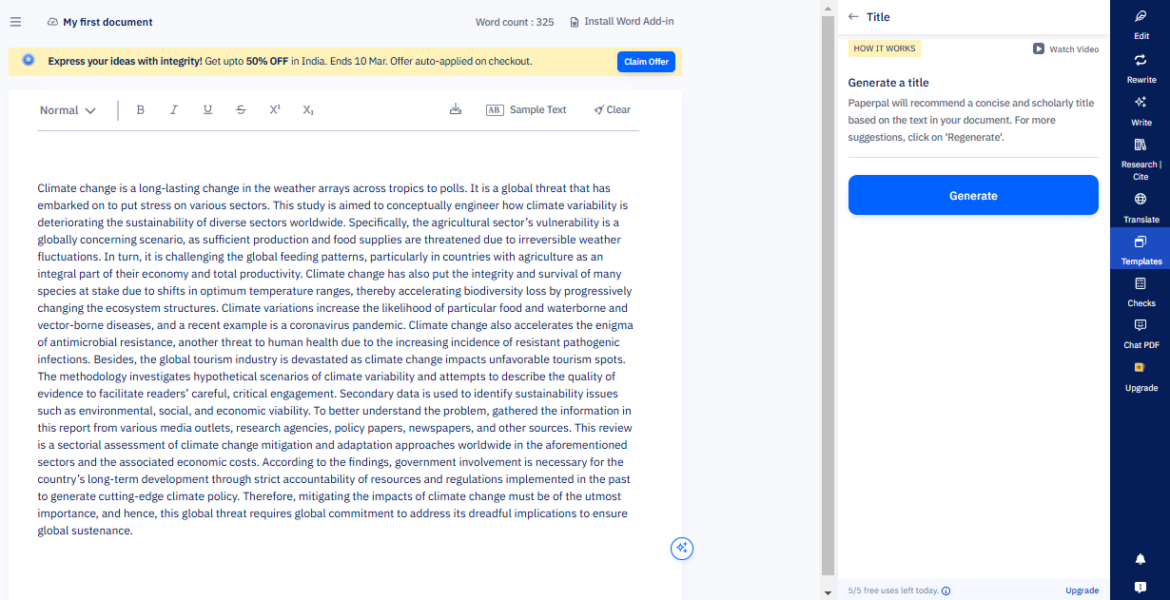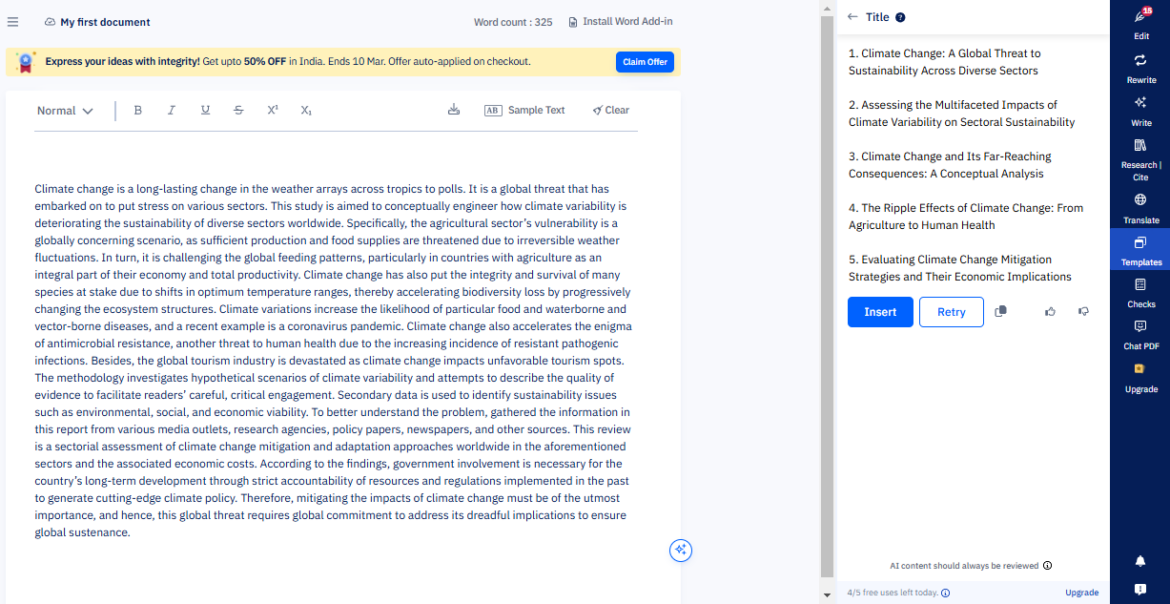Table of Contents
Knowing how to write a research paper title is an art that not every researcher possesses, and researchers often spend a lot of time skimming through articles to find the right research paper title.
According to an interesting estimate, researchers read more than 100 publications every year and spend long hours, weeks and months searching for and reading articles relevant to their field of study.1 While open access publishing and online repositories have made it easier to find articles, researchers still need to browse through a sea of research, often using research paper titles, to find relevant information for their research study. Researchers also face the challenge of ensuring their work reaches a broader audience in order to get more citations. This is where the importance of a good title for a research paper becomes evident.
Your research paper title is one of the first things readers in your research paper and plays an important role in influencing whether they will actually go through the entire article. This makes it critical to have a good research paper title that captures the reader’s attention. In this article, we look at the key characteristics of a good research title and what to keep in mind to create a research title that works for you.
7 steps to follow for writing the best research paper title
Step 1: Convey the key research findings
Before writing a research paper title, list down what your study is about, what you have achieved or discovered, and the methodology used. Try and identify the one or two key elements that make your study novel or significant in your subject area. Combine these elements to create the best research title that showcases your article accurately and effectively.
Step 2: Choose a declarative research paper title
Declarative titles are more informative and help readers to quickly grasp what the body of the article may contain. Therefore, it is considered to be more impactful and more likely to attract the reader’s attention. Additionally, most editors agree that papers with declarative titles are more likely to be shared online, allowing researchers to reach a far wider audience.2
Need a title for your research paper? Paste the text on Paperpal Editor and generate relevant title suggestions in seconds with Paperpal Templaates
Step 3: A good research title must pique reader interest
Researchers browsing through online platforms during their literature search often spend only a few seconds to read the title and evaluate an article’s relevance. This makes it important to create a catchy title for your research paper that will spark curiosity in the minds of your audience, which may prompt them pause, read, share, and discuss your research paper.
Step 4: Avoid making any unsubstantiated claims
This is an important aspect to keep in mind when creating research paper titles. While it may be tempting to write titles with claims that will immediately attract reader attention and get you more citations, your research should be able to back-up these claims with substantive, studied evidence. Failing to do so can create mistrust about the research and even hurt your reputation.
Step 5: Keep it simple and avoid jargon
It’s tempting to use technical words in a research paper title when you know that your primary audience is most likely to be other researchers working in the same field. However, this can prove counter-productive as readers who are not familiar with these complicated words may end up skipping your article. Some early career researchers might also give your paper a pass as they may feel that it is too technical for them so avoid using jargon.
Step 6: Use phrases to keep your research title concise
One mistake early career researchers make is using full sentences to write the research paper title. Avoid complex phrases and unnecessary details as it makes the title unnecessarily lengthy. Remember to ensure proper syntax when trying to rephrase the title to make it leaner. A good research paper title offers a concise summary of the paper’s content; keep your title to under 12 words as lengthy titles can be hard to understand and may seem unfocused and uninteresting.
Step 7: Include keywords to make your article discoverable
Today most researchers turn to online databases and search engines like Google Scholar to find the right research. This makes it critical to identify and use the best keywords for your research subject/topic when creating a research title. The best research paper title is one that is easily discoverable, making it easy for your readers to find and read your article.
A review of more than 150,000 papers submitted to UK’s Research Excellence Framework (REF) database found that the style of a research paper’s title impacted the number of citations it would typically receive.3 Writing a good research paper title is worth the time and effort, and we’re sure the points listed above will help!
How to generate research paper titles with Paperpal?
A research paper title is the first impression for journal editors, reviewers, and readers to understand the aim and purpose of your research study. However, picking a research paper title that encapsulates your research’s content can be daunting. Your research paper title should accurately capture your work, contain highly searched keywords, and should also sound interesting to people who work on a similar topic.
Paperpal’s secure generative AI helps you write research paper titles twice as fast, ensuring they align with your research topic. Follow these simple steps to create an impactful research paper title:
- Sign Up or Log In: Start by creating an account or logging into Paperpal.
- Paste your content: Once logged in, paste your research paper’s content or abstract onto the document.
- Generate your title: Click on ‘Templates’ in the side navigation pane, go to Titles, and select ‘Generate‘.
Paperpal will analyze your content and propose a fitting research paper title. If it doesn’t quite hit the mark, simply click regenerate to get additional title options until you find the perfect one. Remember, while Paperpal provides a solid starting point, personalizing the title to capture the essence of your research is key to making it stand out.
References
- How Scientists Retrieve Publications: An Empirical Study of How the Internet Is Overtaking Paper Media. Journal of Electronic Publishing, December 2000. [Accessed November 3, 2022] Available at https://quod.lib.umich.edu/j/jep/3336451.0006.202?view=text;rgn=main
- Di Girolamo, N. Health care articles with simple and declarative titles were more likely to be in the Altmetric Top 100. Journal of Clinical Epidemiology, December 2016. [Accessed November 3, 2022] Available at https://www.jclinepi.com/article/S0895-4356(16)30853-8/fulltext
- Hudson, J. An analysis of the titles of papers submitted to the UK REF in 2014: authors, disciplines, and stylistic details. Scientometrics, July 2016. [Accessed November 3, 2022] Available at https://link.springer.com/article/10.1007/s11192-016-2081-4
Frequently Asked Questions (FAQs)
It is generally recommended to avoid using a question to write a good research paper title. Titles should be concise and informative, conveying the main focus of the study. While questions can be used in the introduction or research objectives, a clear and declarative title is preferred to accurately represent the content and purpose of the research.
A research paper title should be concise and to the point. Ideally, it should be around 10 to 12 words or less. A shorter title is more effective in grabbing readers’ attention and conveying the main idea succinctly. However, it’s important to ensure that the title still accurately represents the research and provides enough information for readers to understand the scope of the study.
Including specific keywords related to the research topic can be beneficial. Keywords help in indexing and searching for relevant papers. However, it is not necessary to include all keywords in the title. Instead, focus on incorporating essential and relevant keywords that reflect the core aspects of the study. Use keywords that are commonly used and recognized in the field to increase the discoverability and relevance of your research.
Abbreviations or acronyms should generally be avoided in the research paper title. The title should be clear and easily understandable to a broad audience. If an abbreviation is commonly used in the field and is essential to convey the research focus, it can be included, but it’s important to provide the full term upon its first mention in the paper for clarity.
Whether you can change the research paper title after submission depends on the specific guidelines and policies of the journal or conference. Some publications allow minor revisions, including title changes, during the review process. However, it is best to ensure that the title is carefully chosen and reviewed before submission. If a change is necessary, it is recommended to contact the editor or conference organizers for guidance on whether it’s permissible to modify the title.
The preferred formatting style for research paper titles varies depending on the specific guidelines of the target journal or conference. Generally, sentence case is commonly used, where only the first word and proper nouns are capitalized. However, some publications may prefer title case, where the first letter of each major word is capitalized. It is important to carefully review the submission guidelines or consult the specific style guide recommended by the publication to ensure consistency with their preferred formatting style.
Paperpal is a comprehensive AI writing toolkit that helps students and researchers achieve 2x the writing in half the time. It leverages 21+ years of STM experience and insights from millions of research articles to provide in-depth academic writing, language editing, and submission readiness support to help you write better, faster.
Get accurate academic translations, rewriting support, grammar checks, vocabulary suggestions, and generative AI assistance that delivers human precision at machine speed. Try for free or upgrade to Paperpal Prime starting at US$25 a month to access premium features, including consistency, plagiarism, and 30+ submission readiness checks to help you succeed.
Experience the future of academic writing – Sign up to Paperpal and start writing for free!







